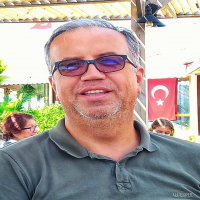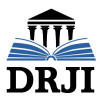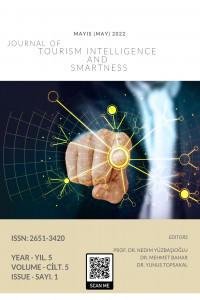Research Article
Issue Editorial Board

Assoc. Prof. Dr.,
Malatya Turgut Ozal University

Aim & Scope
Topics include but are not limited to:
- Knowledge Economy and Smart Destinations
- ICTs Adoption for Regional Development, Sustainability and Tourism Experience
- Emerging technologies, Mobile Services, Gaming, Gamification and Augmented Reality
- Location-based Services, Internet-of-Things and Smart Cities
- Competitiveness, corporate social responsibility, service excellence and service quality
- Social media, Social Networking and ICTs for Partnership and Collaboration
- Human resources management and strategic leadership development
- Innovation, creativity and change management
- Smart region technologies and Open Innovation
- Internet of Thing, Bid Data, Analytics
- Digital and Smart Living
- Smart Territories – Comparative City-coastal/mountain Regions
- Smart Transformations: Innovation, Transition, Governance, Resilience,Change
- Smart Cities and smart tourism
- Digital Social Innovation
- Social Capital & Social Entrepreneurship
- Smart region and smart tourism Strategy & Governance
- Smart Tourism, Smart Travel, Smart hospitality
- Smart Local Governance, Citizen Participation & Communitarian Development
- Smart and Future everything
Topics include but are not limited to:
- Knowledge Economy and Smart Destinations
- ICTs Adoption for Regional Development, Sustainability and Tourism Experience
- Emerging technologies, Mobile Services, Gaming, Gamification and Augmented Reality
- Location-based Services, Internet-of-Things and Smart Cities
- Competitiveness, corporate social responsibility, service excellence and service quality
- Social media, Social Networking and ICTs for Partnership and Collaboration
- Human resources management and strategic leadership development
- Innovation, creativity and change management
- Smart region technologies and Open Innovation
- Internet of Thing, Bid Data, Analytics
- Digital and Smart Living
- Smart Territories – Comparative City-coastal/mountain Regions
- Smart Transformations: Innovation, Transition, Governance, Resilience,Change
- Smart Cities and smart tourism
- Digital Social Innovation
- Social Capital & Social Entrepreneurship
- Smart region and smart tourism Strategy & Governance
- Smart Tourism, Smart Travel, Smart hospitality
- Smart Local Governance, Citizen Participation & Communitarian Development
- Smart and Future everything
Author Guidelines
Submissions should be uploaded with one page Microsoft Word type of files on system. No submission accepted via mail but you could contact with editorial team regarding submission issues on system: topsakal.yunus@gmail.com Manuscripts which are submitted to JTIS should not be submitted for the consideration of publication at the same time for another journal. |
| Reference to a Journal Publication; |
| Higgins-Desbiolles, F. (2006). More than an ‘industry’: the forgotten power of tourism as a social force. Tourism Management, 27(6), 1192-1208.Shaw, G., Bailey, A., & Williams, A. M. (2011). Aspects of service-dominant logic and its implications for tourism management: examples from the hotel industry. Tourism Management, 32, 207-214. |
| Reference to a book; |
| Kotler, P. (2006). Marketing for hospitality and tourism. Upper Saddle River, NJ: Pearson Prentice Hall. Goldstone, P. (2001). Making the world safe for tourism. New Haven and London: Yale University Press. |
| For correct referencing through APA, below links can be advised for more information; |
| http://supp.apa.org/style/PM6E-Corrected-Sample-Papers.pdf |
Ethical Principles and Publication Policy
All papers are subject to double blind peer review process based on an initial screening by the editor criteria for evaluation include significant contribution to the field, conceptual quality, appropriate methodology and clarity of exposition. The publication of an article in a “double blind peer-reviewed” journal is essential in the development of a consistent and respected network of knowledge. In double blind peer-review, articles written by ‘prestigious’ or renowned authors are considered on the basis of the content of their papers, rather than on the author’s reputation. It is therefore essential to agree upon standards of expected ethical behaviour for all parties involved in the act of publishing: the authors, the journal editor, and the peer reviewers. The authors should ensure that they have written entirely original works, and if the authors have used the work and/or words of others that this has been appropriately cited or quoted. The following duties outlined for editors, authors and reviewers are developed by following COPE Code of Conduct for Journal Editors and Elsevier Guidelines for Publication Ethics and Malpractice Statement.
The Responsibilities of Editors
Publication Decisions: The editor is responsible for deciding which of the articles submitted to the journal will be published. The validation of the work in question and its importance to researchers and readers must always drive such decisions. The editor may be guided by the policies of the journal's editorial board and constrained by such legal requirements as shall then be in force regarding libel, copyright infringement and plagiarism. Current legal requirements regarding libel, copyright infringement, and plagiarism should also be considered. The editor will evaluate manuscripts without regard to the authors' race, gender, sexual orientation, religious belief, ethnic origin, citizenship, or political philosophy. The decision will be based on the paper’s importance, originality and clarity, and the study’s validity and its relevance to the journal's scope. The editor may confer with other editors or reviewers in making this decision.
Process Control: Editor must ensure that each manuscript is initially evaluated by the editor for originality, making use of appropriate software to do so. After passing this test, the manuscript is forwarded to two reviewers for single-blind peer review, each of whom will make a recommendation to accept, reject, or modify the manuscript. The review period will be up to 30 days.
Fair Play: The editor should evaluate manuscripts for their intellectual content without regard to race, gender, sexual orientation, religious belief, ethnic origin, citizenship, or political philosophy of the authors.
Confidentiality: The editor must ensure that information regarding manuscripts submitted by the authors is kept confidential. The editor and any editorial staff must not disclose any information about a submitted manuscript to anyone other than the corresponding author, reviewers, potential reviewers, other editorial advisers, and the publisher, as appropriate.
Disclosure and Conflicts of Interest: Unpublished materials disclosed in a submitted manuscript will not be used by the editor or the members of the editorial board for their own research purposes without the author's explicit written consent. Privileged information or ideas obtained through peer review must be kept confidential and not used for personal advantage. Editors should restrain themselves (i.e. should ask a co-editor, associate editor or other member of the editorial board instead to review and consider) from considering manuscripts in which they have conflicts of interest resulting from competitive, collaborative, or other relationships or connections with any of the authors, companies, or (possibly) institutions connected to the papers. Editors should require all contributors to disclose relevant competing interests and publish corrections if competing interests are revealed after publication. If needed, other appropriate action should be taken, such as the publication of a retraction or expression of concern.
The Responsibilities of Reviewers
Contribution to Editorial Decisions: The peer-reviewing process assists the editor and the editorial board in making editorial decisions and through the editorial communications with the author may also assist the author in improving the paper. Peer review is an essential component of formal scholarly communication, and lies at the heart of the scientific method.
Promptness: Any selected referee who feels unqualified to review the research reported in a manuscript or knows that its prompt review will be impossible should notify the editor and withdraw from the review process, so that the manuscript could be sent to another reviewer.
Confidentiality: Information regarding manuscripts submitted by authors should be kept confidential and be treated as privileged information. Any manuscripts received for review must be treated as confidential documents. They must not be disclosed to or discussed with others except as authorized by the editor.
Standards of Objectivity: Reviews of submitted manuscripts should be conducted objectively. Personal criticism of the author is inappropriateand the reviewersshould express their views clearly with supporting arguments.
Acknowledgement of Sources: Manuscript reviewers must ensure that authors have acknowledged all sources of data used in the research. Reviewers should identify cases in which relevant published work referred to in the paper has not been cited by the authors in the reference section. Any statement that an observation, derivation, or argument had been previously reported should be accompanied by the relevant citation. Reviewers should also notify the editor of any substantial similarity or overlap between the manuscript under consideration and any other published paper of which they have personal knowledge.
Disclosure and Conflict of Interest: Unpublished materials disclosed in a submitted manuscript must not be used in a reviewer’s own research without the express written consent of the author. Privileged information or ideas obtained through peer review must be kept confidential and not used for personal advantage. Reviewers should not consider manuscripts in which they have conflicts of interest resulting from competitive, collaborative, or other relationships or connections with any of the authors, companies, or institutions connected to the papers.
Process Scheduling: The process scheduling includes; developing a reviewer database, assignment of reviewers by the editors, submitting manuscripts to the journal by the authors and making initial assessment by the editors if paper is suitable for the journal and if peer review is warranted. After editors select reviewers and inviting them to review, the reviewers complete the review and provide recommendations and comments to the editor and authors. Continuation of the process scheduling includes; making decision to accept the submission, ask authors for a revision or reject the submission by the editors. After editors base their rejections on negative recommendations in the peer review process, authors receive comments from the editors that describe some of the weaknesses of their submission. Ideally, authors consider these comments and revise the paper before they send it to another journal.
Contribution to the Quality of Work: The quality of the work includes originality of subject or application, appropriateness of methods, accuracy of mathematical equations and computations, validity of conclusions, organization of subject matter, clarity and communicational competence, so to be acceptable a manuscript must make a worthwhile and significant contribution to the advancement of knowledge. The reviewers’ professional, objective and thorough review process will contribute to the quality of work and enhance the quality of published research.
The Responsibilities of Authors
Reporting Standards:Authors of original research reports should present an accurate account of the work performed as well as an objective discussion of its significance. Manuscripts will follow the submission guidelines of the journal. Underlying data should be represented accurately in the paper. A paper should contain sufficient detail and references to permit others to replicate the work. Fraudulent or knowingly inaccurate statements constitute unethical behaviour and are unacceptable.
Originality: Authors will submit only entirely original works, and will appropriately cite or quote the work and/or words of others. Publications that have been influential in determining the nature of the reported work should also be cited.
Multiple, Redundant, or Concurrent Publications:In general, manuscripts describing essentially the same research should not be published in more than one journal or primary publication. Submitting the same paper to more than one journal concurrently constitutes unethical publishing behaviour and is unacceptable. Manuscripts which have been published as copyrighted material elsewhere cannot be submitted. In addition, manuscripts under review by the journal should not be resubmitted to copyrighted publications. In general, an author should not submit for consideration in another journal a previously published paper. Publication of some kinds of articles (e.g. translations) in more than one journal is sometimes justifiable, provided certain conditions are met. The authors and editors of the journals concerned must agree to the secondary publication, which must reflect the same data and interpretation of the primary document. The primary reference must be cited in the secondary publication.
Acknowledgement of Sources:Authors should acknowledge all sources of data used in the research and cite publications that have been influential in research work. Information obtained privately, as in conversation, correspondence, or discussion with third parties, must not be used or reported without explicit, written permission from the source. Information obtained in the course of confidential services, such as refereeing manuscripts or grant applications, must not be used without the explicit written permission of the author of the work involved in these services.
Authorship of the Paper: Authorship should be limited to those who have made a significant contribution to the conception, design, execution, or interpretation of the reported study. All those who have made significant contributions should be listed as co-authors. Where there are others who have participated in certain substantive aspects of the research project, they should be acknowledged or listed as contributors. The corresponding author should ensure that all appropriate co-authors and no uninvolved persons are included in the author list. The corresponding author will also verify that all co-authors have approved the final version of the paper and have agreed to the submitted version of the manuscript and their inclusion of names as co-authors.
Data Access and Retention: Authors may be asked to provide the raw data in connection with a paper for editorial review, and should be prepared to provide public access to such data, if practicable, and should in any event be prepared to retain such data for a reasonable time after publication. In any event, authors should ensure accessibility of such data to other competent professionals for at least ten years after publication (preferably via an institutional or subject-based data repository or other data centre), provided that the confidentiality of the participants can be protected and legal rights concerning proprietary data do not preclude their release.
Specifying the Used Fund: All authors should include a statement disclosing any financial or other substantive conflicts of interest that may be construed to influence the results or interpretation of their manuscript. All sources of financial support for the project should be disclosed. Examples of potential conflicts of interest which should be disclosed include employment, consultancies, stock ownership, honoraria, paid expert testimony, patent applications/registrations, and grants or other funding. Potential conflicts of interest should be disclosed at the earliest stage possible.
Spell Checking: When an author discovers a significant error or inaccuracy in submitted manuscript, it is the author’s obligation to promptly notify the journal editor and cooperate with the editor to retract or correct the paper. If the editor learns from a third party that a published work contains a significant error, it is the obligation of the author to promptly retract or correct the paper or provide evidence to the editor of the correctness of the original paper.
Copyright Agreement: Authors should take into account the rights related to the publication and distribution of research.
Avoiding the Practices that Harm the Environment: If the work involves the use of animal or human subjects, the author should ensure that the manuscript contains a statement that all procedures were performed in compliance with relevant laws and institutional guidelines and that the appropriate institutional committee(s) has approved them. Authors should include a statement in the manuscript that informed consent was obtained for experimentation with human subjects. The privacy rights of human subjects must always be observed and the author should avoid the practices that harm the environment.
Open Access
Sharing of the research results is an important component of the research process; research can only advance by sharing the results, and the value of an investment in research is only maximized through wide use of its results. Open Access articles are free to all interested readers, and the publishers place no financial or copyright barriers between the readers and the article.
© You are free to copy, distribute, display and perform the work as long as you give the original author(s) credit, do not use this work for commercial purposes, and do not alter, transform, or build upon this work.
Plagiarism Detection
Prevention of plagiarism is essential as it provides scientific and academic integrity. Therefore, Journal of Tourism Intelligence and Smartness (JTIS) uses the iThenticate Plagiarism Detection Software for controlling plagiarism concerns.
Price Policy
There are no article submission, processing and publishing charges
Indexes
Citation Indexes
Other Indexes
Journal Boards
Editor-in-Chief

Editor

Associate Editors




Language Editor

Secretary

Layout Editor























